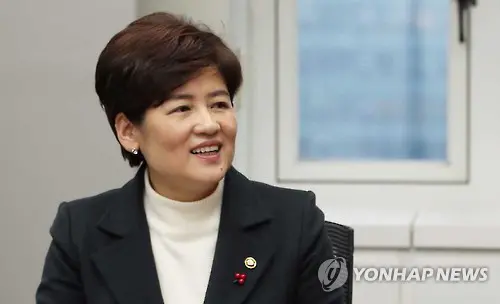South Korean gender equality minister regretted that the Seoul-Tokyo agreement on Japan's wartime sex slaves has gone undervalued among the local public, particularly in terms of the Japanese government's donation of a huge fund for the women.
She made the comment during an interview with Yonhap News Agency held on Friday, five days ahead of the first anniversary of the landmark agreement.
Minister Kang Eun-hee of Gender Equality and Family speaks during an interview with Yonhap News Agency in her office in central Seoul on Dec. 23, 2016. Photo: Yonhap
Under the Dec. 28 deal, Tokyo apologized for its colonial-era atrocities and provided 1 billion yen (US$9.61 million) for the creation of a South Korean foundation devoted to supporting the victims to end deep-rooted diplomatic feuds over the issue. But the historic agreement has failed to get the attention it deserves, as Japan increased its calls to remove a statue of a girl symbolizing Korean wartime sex slaves that is located in front of the Japanese Embassy in central Seoul along with the transfer of the funds.
"The controversy about the girl statue went off even before the agreement results properly reached the people. That put us in a situation where the (true) meaning of the agreement got blurry and was overlooked," Minister of Gender Equality and Family Kang Eun-hee said. "It's regrettable that the government's (following) announcement to perceive and make efforts to repel the Japanese government's concerns over the girl statue issue has lessened its apology, remorse and heartfelt repentance in the agreement."
She said the deal was timely considering the aging victims.
"Some critics say the agreement was made in a rush, but the average age of these victims is 91. Seven have passed away since I came to office a year ago. I think it was right to seal the deal while as many victims as possible were alive."
A bronze statue of a "comfort woman" sits across from the Japanese Embassy in central Seoul on May 20, 2016. Photo: Yonhap
The minister viewed that the agreement result was "the most advanced outcome" of its kind, compared to the results of negotiations made by previous administrations.
The number of surviving victims stood at 46 at the time of the agreement, 36 of which had consultations with Korean authorities about the compensation plan. Among them, 34 agreed to accept the Japanese government's compensation fund.
The compensation guideline allocates 100 million won (US$83,000) for each surviving victim and 20 million won for the family of the deceased victims.
A former comfort woman shakes hands with Gender Minister Kang Eun-hee (L) at the National Assembly in Seoul on July 21, 2016, before a news conference to call for the enactment of a special law on former "comfort women." Photo: Yonhap
"Apart from the foundation's operation, the ministry is planning to spend more of the budget on a project to build a memorial monument in Cheonan," she continued.
Regarding the compilation project for a white paper on the comfort women, Kang said the project will better serve its purpose if it is published in a form of a report instead.
"The project comprises separate studies by civil experts, so it would be difficult to say that they perfectly represent the government's stance. A white paper invites additional participation by government officials and results in consensus throughout," she added.
In addition to the comfort women issue, the minister called for public support for gender equality, particularly in the corporate culture.
"The balance in work and family must be settled as a corporate culture, and no longer a personal issue. Childbirth is a predictable matter, which makes it necessary for the company to fathom demand for child care leave and substitutes."
Pregnant employees are discouraged from taking child care leave in small and medium-sized companies, the minister said. Her solution to this long-stalled social issue is "early hiring of new employees and interns to fill in for the expecting workers."
For her second year as gender minister, Kang aimed at parenting education as part of government efforts to combat child abuse.
"Child abuse is a problem that stems from a faltering family system and parenting capacity. We are working on education programs for parenting, according to different phases of a life cycle."
The ministry recently finished developing an education program for youth as prospective parents.
"The balance between work and family remains by far the most important agenda of our times," Kang emphasized.
(Yonhap)
 简体中文
简体中文

